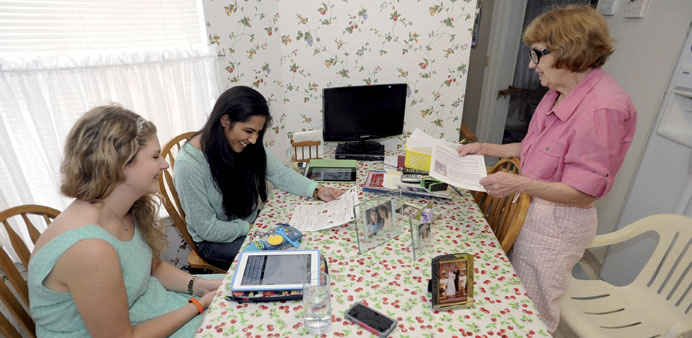Drexel students Erica Tuttle, (left) and Saadiya Ali talk with Nancy Manion about her husband John Manion who passed away in July. They are students in a class called A Beautiful Life and were assigned to Manion to write a journal about her husband.
By Melissa Dribben
Saadiya Ali, Erica Tuttle and Nancy Manion could not say goodbye. When they reached the screen door of Manion’s neat little Bensalem house, they hesitated on the threshold, hugging one another, promising to stay in touch, fighting back tears.
The three women had met only in mid-July. They had spoken only a half-dozen times. And Manion had done most of the talking.
But in those six weeks, they had given one another the kind of comfort, kindness and enlightenment that some friends — and many relatives — never achieve in a lifetime.
“It’s like I’ve got my grandma again,” said Ali, 20, a premed student at Drexel University.
“It meant so much to me, hearing stories from back in the day,” said her classmate Tuttle, also 20, a biology major preparing to become a veterinarian.
“My girls,” Manion said, stroking their hair. “They helped me get through some very bad days.”
Their brief but intense relationship began in an English class — It’s a Beautiful Life — that was offered for the first time at Drexel over the summer. Designed in co-operation with Crossroads Hospice, an agency that provides care and comfort to the terminally ill, the class assigned students to interview dying patients and write their life stories.
Nancy Manion’s husband, John, an 86-year-old retired professor of accounting at Temple University, had volunteered to be interviewed by students. But a few days before Ali and Tuttle were scheduled to meet him, he died of a stroke.
To honour John’s memory, his widow asked if she could tell his story to the students.
And so, once a week for six weeks, she dug out scrapbooks and old photographs, brewed a pot of Eight O’Clock coffee, sat down with the young women at the plastic cherry-print tablecloth in her kitchen, and regaled them with tales.
Tales like the one about how they met in the blizzard of 1996, when he, the chivalrous neighbour, offered her a ride across Roosevelt Boulevard. The one about how, when John learned she had allowed a cashier to undercharge her for a box of Miracle-Gro, he shamed her into donating the ill-gotten gain to charity. And the one about how he was such a proper dresser that he sometimes wore a suit when he mowed the lawn.
“He was a very unassuming man that did so much good quietly,” Manion said. “Talking about him, it was a break from the heartache.”
Drexel English professor Ken Bingham, who teaches the course, said that from the moment it was proposed, the concept struck him as brilliant.
“I teach Shakespeare, Dickens, theater,” said Bingham, 53. “But this is a class about life. You go into teaching because you want to make a difference. And that is exactly what this course has done.”
It is common for hospice patients to question the meaning of their lives, said Kimberly Mumper, volunteer co-ordinator for Crossroads Hospice.
They benefit from the therapeutic comfort that comes from having someone’s undivided attention, someone who is interested in hearing about childhood traumas, regrets and victories, however small, memories of parents long gone and bits of hard-won wisdom. And they find, Mumper said, that the telling itself can provide unexpected perspective on the past.
Few of the patients had the fancy degrees or jobs that earn public recognition. They were gravestone engravers, factory workers and homemakers.
Yet describing all they have seen and experienced “gives the patients a sense of accomplishment.”
For many of the students, the listening turned out to be comforting as well.
“Most of them are young,” Bingham said. “They’re afraid of death. By facing it, they find it’s nothing to be afraid of.”
The students’ journals, he said, “have been breathtaking.”
One young woman wrote: “I got off on the fourth floor of St. Ignatius and immediately the fear struck. There were patients everywhere, sitting, talking to themselves, laughing, singing. It was the most melancholic scenery I’ve ever experienced. I wanted to run home. I have no idea what kept my feet moving. I found 427A and knocked lightly on the door. ...
“I pulled up a chair and he flew. The words came rushing out as if they had been cramped inside him for decades. There is so much beauty in the soul of this man; it’s hard to believe light didn’t pour out with his words.”
In class August 27, the last day of the course, students presented projects they had done for and about the patients they had followed.
A scrapbook with photographs of Gloria, who loved gardening, cleaning and smoking cigarettes and who died August 2 at 90 with the rich scent of nicotine still on her breath.
A letter written to Tommy, a 76-year-old karate master and ex-convict, thanking him for teaching her the difference between being alone and being lonely and “the art of getting lost in my own thoughts.”
And, finally, a collection of stories and photographs, with a sound track, that Ali and Tuttle made for Nancy Manion.
“I think sometimes you don’t value a person until you’ve lost them,” Ali said. On the doorstep, when they left her after their last visit, they promised to return.
“It’s not over yet,” Ali said. “It never will be.” — The Philadelphia Inquirer/MCT

